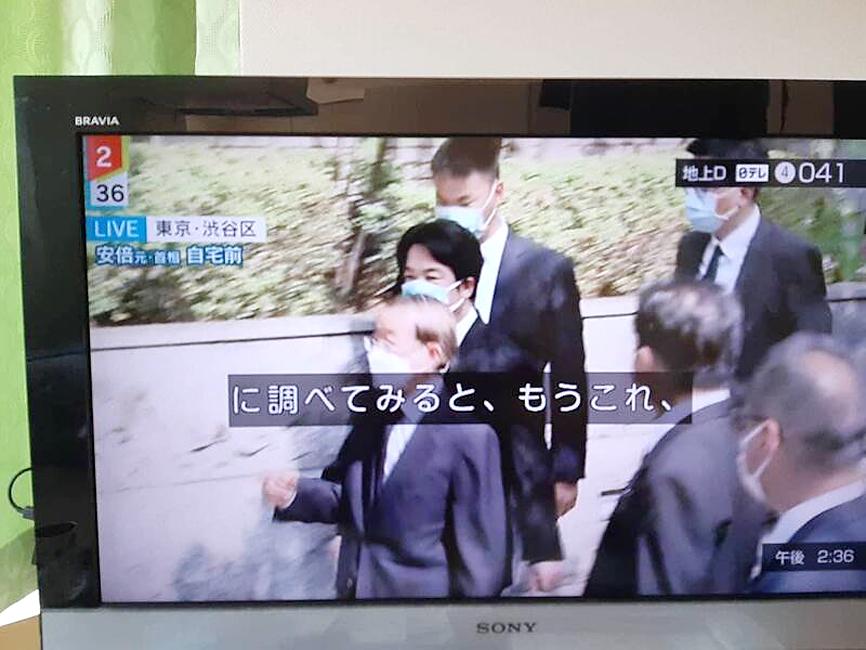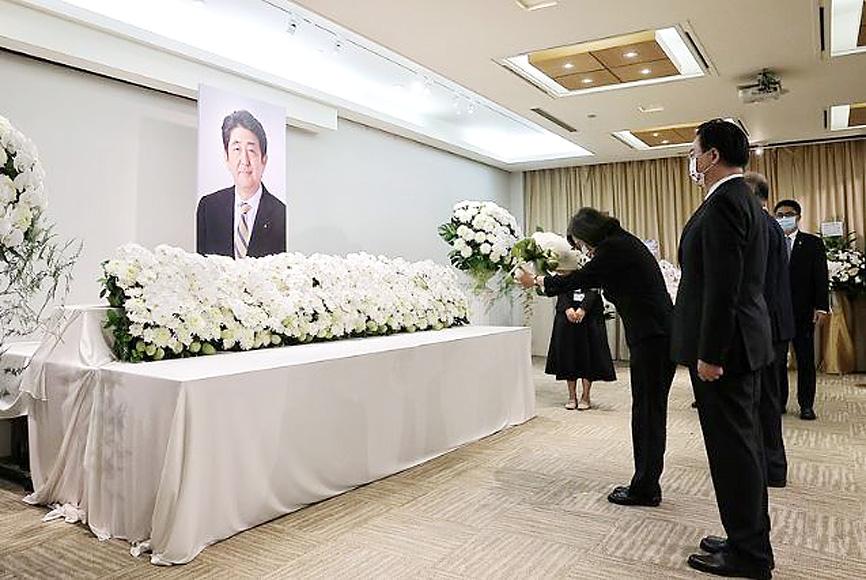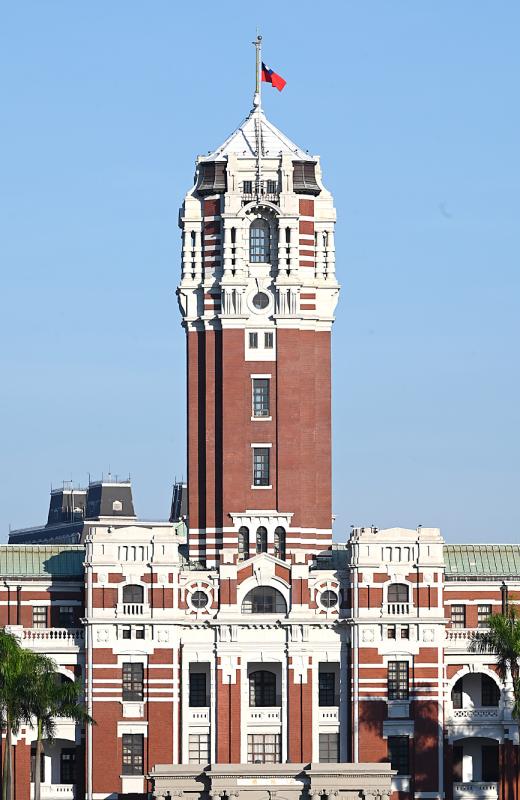Vice President William Lai (賴清德) yesterday became the most senior Taiwanese official to visit Japan in five decades when he traveled to Tokyo to offer condolences after the assassination of former Japanese prime minister Shinzo Abe.
Tokyo broke official ties with Taipei in 1972 and established relations with Beijing.
Lai’s visit was regarded as a part of his “personal itinerary,” based on a tacit understanding between Taiwan and Japan, sources said.

Photo: screen grab from Twitter
The Ministry of Foreign Affairs said it had no comment on Lai’s personal schedule.
Japanese TV news footage showed Lai, accompanied by Representative to Japan Frank Hsieh (謝長廷), visiting Abe’s residence in Tokyo to offer his condolences.
Lai is scheduled to attend Abe’s funeral today, the sources said.

Photo courtesy of the Presidential Office
The Japanese Ministry of Foreign Affairs was not immediately available for comment.
Although Tokyo has no formal diplomatic ties with Taipei, some senior Japanese officials have become increasingly outspoken in their support for Taiwan in the past few years.
In Taipei, President Tsai Ing-wen (蔡英文) offered condolences in a visit to the Japan-Taiwan Exchange Association (JTEA) yesterday morning.

Photo: Tien Yu-hua, Taipei Times
Abe, the longest-serving prime minister in Japan, died on Friday at the age of 67 after he was shot in the back that morning while campaigning on the street in the city of Nara for the Diet’s upper house elections held on Sunday. Police arrested a 41-year-old male suspect who allegedly shot Abe with a homemade shotgun.
Tsai has ordered flags to be flown at half-staff yesterday to honor Abe, who was widely considered in Taiwan to have contributed to bilateral ties.
Tsai yesterday said she was offering condolences to Abe’s family of behalf of the government and the people of Taiwan.
She said she clearly remembers Abe’s warm smile and greetings as they spoke during an online meeting in March, adding that they had expressed the hope of meeting in person soon.
“Thank you for your contribution to the friendship between Taiwan and Japan as well as to the world’s democracy, freedom, human rights and peace,” Tsai wrote on a memorial wall set up by the JTEA.
Abe will be “the good friend of Taiwan forever,” she wrote.
Tsai was accompanied at the JTEA by Presidential Office Secretary-General David Lee (李大維) and Minister of Foreign Affairs Joseph Wu (吳釗燮). They were welcomed by Japanese Representative to Taiwan Mitsuo Ohashi.
Premier Su Tseng-chang (蘇貞昌) and Legislative Speaker You Si-kun (游錫堃) separately visited the JTEA to offer their condolences.
Su said he was grateful for Abe’s assistance in facilitating the donation of millions of AstraZeneca COVID-19 vaccine doses from Japan to Taiwan last year, when Taiwan was facing a shortage of vaccines.
Abe repeatedly voiced his support for Taiwan whenever the nation faced political suppression by China, even saying the US and Japan could not idly stand by if Taiwan were attacked by China, Su said.
You said he met with Abe several times when he visited Japan, adding that the former prime minister received him in person.
Even when the Democratic Progressive Party was in opposition from 2000 to 2008, Abe still received him in his office, You said, adding that the gesture touched him.

SECURITY: As China is ‘reshaping’ Hong Kong’s population, Taiwan must raise the eligibility threshold for applications from Hong Kongers, Chiu Chui-cheng said When Hong Kong and Macau citizens apply for residency in Taiwan, it would be under a new category that includes a “national security observation period,” Mainland Affairs Council (MAC) Minister Chiu Chui-cheng (邱垂正) said yesterday. President William Lai (賴清德) on March 13 announced 17 strategies to counter China’s aggression toward Taiwan, including incorporating national security considerations into the review process for residency applications from Hong Kong and Macau citizens. The situation in Hong Kong is constantly changing, Chiu said to media yesterday on the sidelines of the Taipei Technology Run hosted by the Taipei Neihu Technology Park Development Association. With

CARROT AND STICK: While unrelenting in its military threats, China attracted nearly 40,000 Taiwanese to over 400 business events last year Nearly 40,000 Taiwanese last year joined industry events in China, such as conferences and trade fairs, supported by the Chinese government, a study showed yesterday, as Beijing ramps up a charm offensive toward Taipei alongside military pressure. China has long taken a carrot-and-stick approach to Taiwan, threatening it with the prospect of military action while reaching out to those it believes are amenable to Beijing’s point of view. Taiwanese security officials are wary of what they see as Beijing’s influence campaigns to sway public opinion after Taipei and Beijing gradually resumed travel links halted by the COVID-19 pandemic, but the scale of

A US Marine Corps regiment equipped with Naval Strike Missiles (NSM) is set to participate in the upcoming Balikatan 25 exercise in the Luzon Strait, marking the system’s first-ever deployment in the Philippines. US and Philippine officials have separately confirmed that the Navy Marine Expeditionary Ship Interdiction System (NMESIS) — the mobile launch platform for the Naval Strike Missile — would take part in the joint exercise. The missiles are being deployed to “a strategic first island chain chokepoint” in the waters between Taiwan proper and the Philippines, US-based Naval News reported. “The Luzon Strait and Bashi Channel represent a critical access

Pope Francis is be laid to rest on Saturday after lying in state for three days in St Peter’s Basilica, where the faithful are expected to flock to pay their respects to history’s first Latin American pontiff. The cardinals met yesterday in the Vatican’s synod hall to chart the next steps before a conclave begins to choose Francis’ successor, as condolences poured in from around the world. According to current norms, the conclave must begin between May 5 and 10. The cardinals set the funeral for Saturday at 10am in St Peter’s Square, to be celebrated by the dean of the College